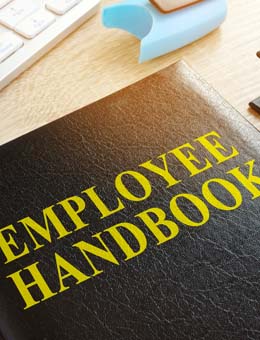
Essential Company Policies for Retailers
Think about some of your favorite teachers or bosses. Here’s something they probably each had in common: clear rules. You understood exactly where you stood, and you didn’t have to guess with them. People appreciate knowing what they can and can’t do regardless of the situation. It is essential that retailers have employee handbooks where the company policies and rules are clearly stated.
A 2016 study found that people are more stressed when they feel uncertainty. People prefer certainty even if what they are certain about is something negative (in the study, it was a slight electric shock). In order to reduce ambiguity and to create the boundaries necessary in every work environment, retail leaders need to create a company handbook with the company’s rules laid out.
Keeping it Legal
While easing employee uncertainty and tamping down stress are certainly helpful and important reasons for creating a company handbook, ensuring legality is also a key. Due to the large number of employment lawsuits filed each year, retailers need to expect that at some point they will face a claim.
Computer software company Paycor, which focuses on human resources, says, “When [an employment lawsuit] happens, one of the most useful documents you can provide your attorney or third party investigator will be a copy of your employee handbook. A thorough and compliant employee handbook will help to show that the organization exercised “reasonable care” towards its employees.”
Retailers should have employees sign the company handbook to acknowledge receipt and agreement to comply with the employment terms. The signature also confirms the employee had an opportunity to ask related questions. Finally, the handbook should note whom employees can reach out to for help.
Regulatory Topics
Every business regardless of size or location must comply with state and federal employment laws. Paycor says, “Your handbook not only communicates these various entitlements and obligations to employees but is useful in demonstrating that your organization strives to be compliant with these regulations… Similar policies should communicate rights and obligations regarding state disability leaves, federal FMLA leave, and other government mandates.” Some critics may question the need for enumerating legal requirements in an employee handbook, and further note that it’s rarely read by new employees. However, having this type of content included is an indicator of the retailer’s professionalism and recognition of its obligations which can ease employee concerns.
Knowing the procedures and the consequences of breaking the rules will reduce employee frustration, argument, and disappointment.
Workplace Rules
In an ideal world, each retail employee will act and perform as a mature professional. They will automatically know what is expected of them and arrive to work each day ready to deliver results just the way we would. But that’s in an ideal world. Therefore, the employee handbook should cover basic rules related to performance and non-performance, dress/appearance, time off, disciplinary procedures, and compensation. This way, employees can be clear of expectations which impact them daily. Knowing the procedures and the consequences of breaking the rules will reduce employee frustration, argument, and disappointment.
For a new retail manager (or new to the company), knowing the company handbook can be a great assistance. Managers of small retail businesses are being pulled in many directions. Knowing the company handbook, which thoroughly details company rules regarding engagement with employees, vendors, and customers, makes the manager’s job easier. She or he can focus on satisfying customers and not continuously determining how to handle a potentially explosive employee, vendor, or customer situation.
Setting the Tone
An employee handbook should also include a company’s history and mission, which can motivate employees and help them better understand their role in the company’s goals. Employees can better empathize with management, have visibility into the bigger picture, and feel inspired to help fulfill the company mission. According to Forbes, “Mission-driven workers are 54 percent more likely to stay for five years at a company and 30 percent more likely to grow into high performers than those who arrive at work with only their paycheck as the motivator.”
When is the Right Time?
The ideal time to create a company handbook that lays out policies and procedures is prior to the retail business’ opening, but creating an employee handbook at any time is beneficial. The Balance Small Business suggests that retail owners/management should, “decide how you would like [for] your retail store and your employees to handle” various elements of business. Entrepreneur suggests creating a company handbook and, “….write down rules that outline every one of your expectations. … By focusing on the details now—under fairly unpressured circumstances—you’ll be able to meet decision-making demands when under stress, and your employees will do what you want them to do.”
For retail companies that did not create an employee handbook prior to their opening, it’s not too late. In fact, the need for a handbook becomes even more important as small businesses add more employees and additional locations. To create an employee handbook after a retail business has been opened, Business Performance Publications suggests gathering employee memos, notices, letters and information and organizing the information into categories. To update a handbook, they suggest, “list one policy per page and include an effective date as well as a revision date.”
Every retail company should have an employee handbook, and it’s never too late to create one. It will make for better employee relationships, potentially address issues before they arise, and establish procedures for when issues do arise. An employee handbook can also make both employees and managers better because each can act with greater certainty of expectation.
